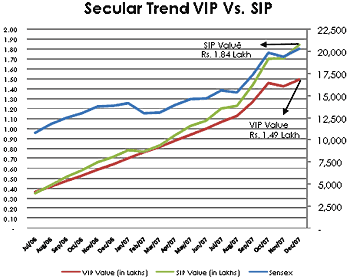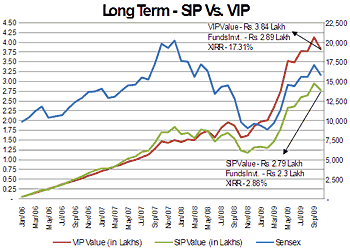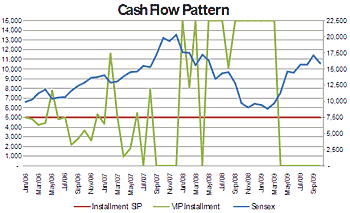
In the second and concluding part on value averaging investment plans, we substantiate on how this newly arrived cousin does better than the traditional systematic investment plan. We do our bit of number crunching to understand and enumerate this argument.
There are a few key considerations to keep in mind prior to zeroing on one of the options shown in the table below:
In the adjacent graph, the markets started at 12,938 levels in February 2007. These were the good days of yore when the market used to scale over 1,000 points in a matter of few trading sessions. The markets by December 2007 had scaled up till 20,287.

Broadly, this was a unidirectional trend.
In such a scenario, the SIP portfolio ended with a value of Rs 1.84 lakh and VIP (value averaging investment plan) portfolio ended up with Rs 1.49 lakh: this may trigger the thought that SIP outperformed, but citing the lack of opportunities to deploy funds in the market, the VIP consistently deployed lower funds on every uptick in the market, hence not much funds were invested at the end of the day, thereby the underperformance.

In the long term, VIP could be an interesting proposition.
For some one who enrolled in such an arrangement in January 2006, when the market was at 9,919 levels would have had to go through a roller coaster ride and see a complete market cycle of a bull run and then a slump, post which a revival, as of October 2009 market stood at 15,896 levels.
VIP works well over a downtrend, since one consistently deploys higher funds at every dip as compared to a SIP where an equated installment is deployed.
However, the results are only seen over a market cycle, when there is a turnaround the VIP will start outperforming the SIP.

As stated earlier, the accumulation of units in case of VIP mode of investment is starkly negatively correlated with the market, however, in case of SIP the investment is even there are no surprises on the amount that will be debited from your account.
The cost pattern movement is illustrated in the adjacent graph:
The VIP installment in the above example is capped at Rs 15,000 per month, the investment pattern is extremely volatile in case of a VIP, whereas an SIP is more uniform.
When someone caps the maximum debit at Rs 15,000 per month, then the possibility of monthly debit would be Rs 0 to Rs 15,000 per month.

Although there are significant positives within the VIP strategy of investments in the long term, it is definitely not without downsides:
Summing it all up...
The VIP by investing a higher amount when market falls and a lower amount when markets are bullish delivers better returns in the long term. In the short term if markets are in a continuous up trend the VIP could under perform the SIP. The negatives are that there is only one company providing a VIP at this point and one does not have the choice of one's favourite funds. Considering that the SIP installments can vary every month, managing cash flows can be a challenge in the case of a VIP.
If you are a long-term investor, it is time you started your VIP today.